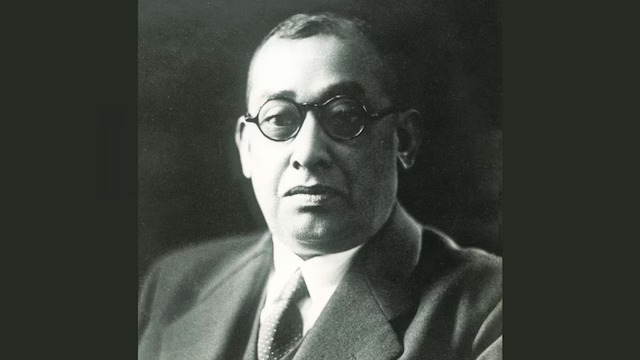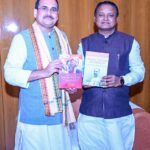To Be Reborn To Carry On India’s Fight For Freedom – Tribute to Rash Behari Bose
- By : Dr Anirban Ganguly
- Category : Articles

As we remember him on his birth anniversary, we see Rash Behari Bose and his legacy making a comeback in our national discourse
“I mean no disrespect to Shri Rasa Bihari Basu [Rash Behari Bose]. But he went to Japan and became a citizen and national of Japan. He married there, had children there and cut himself off practically from India. His family lives in Japan as Japanese citizens…There are very eminent persons who sacrificed their lives in India’s struggle for freedom, who died abroad and whose memory we cherish. We have not thought at any time of searching for their ashes or whatever remains of them and to bring them here. It is not that we have any objection to his ashes coming here. But they honour it in Japan, because in Japan we know that one of the old worships of Japan is ‘Shinto worship’ or worship of ancestors. I understand that the ashes of Shri Rasa Bihari Basu are honoured in his family and worshipped in his family.”
This is how, in a few perfunctory and disjointed sentences, India’s first Prime Minister Pandit Jawaharlal Nehru summed up revolutionary leader Rash Behari Bose’s life of epic proportions on November 24, 1961 in the Lok Sabha. Nehru himself was cut-off from the revolutionary dimension of the freedom struggle and never cared to honour revolutionary nationalists and their legacies in independent India. The reason was not far to seek. He must have thought that honouring the legacies of the revolutionaries would overshadow or minimise his role or that of his own group in the freedom movement.
Contrast Nehru’s attitude towards Rash Behari Bose with that of Narendra Modi, who as the Chief Minister of Gujarat, had undertaken a historic and unprecedented initiative to repatriate the ashes of iconic revolutionary Shyamji Krishna Varma in 2003. Varma, who had died in Geneva in 1930, had willed that his ashes be immersed in a free India. Since then and for 56 years after independence, Varma’s ashes lay in a vault in Geneva, till Modi brought them back to India. Recalling that historic moment, Modi observed that bringing back the ashes of Shyamji Krishna Varma was “one of the most special moments” of his life and “the fervour and pride it generated across the nation was unimaginable, particularly among the youth”. Not only did he bring Varma’s ashes back, Modi also undertook a 2000 km “Veeranjali Yatra” with it, starting from Mumbai and covering 17 districts of Gujarat. A sea of people turned out to pay tribute to the legacy of Varma across every district.
Historian Joseph McQuade candidly argues in his biography of Rash Behari Bose, ‘Fugitive of Empire’, that during the historic INA trial held at the Red Fort in Delhi, “with Nehru himself serving as the defence attorney for the accused [the INA soldiers and officers], the Congress rode the coat-tails of a political project that they had in fact vehemently opposed”. It is well-known that public sentiment in India at that time was very strong in support of the INA soldiers. Congress leaders, especially Nehru, were reluctantly forced to don the attorney’s coat and come out in their support.
Thinker, political philosopher and one of the founding pillars of the Bharatiya Jana Sangh, political predecessor of the BJP, Pandit Deendayal Upadhyaya, pointed fingers at this Congress habit of grabbing all credit for the freedom movement. “Congressmen today make loud claims that it was they who got independence for India,” wrote Upadhyaya, “They must answer whether individuals like Yogi Aurobindo Ghose and the armed freedom fighters who sacrificed their lives in prison in the Andaman Islands were Congressmen? Vasudev Balwant Phadke, an armed freedom fighter who fought for India’s freedom, did so outside the Congress world. Were Rash Behari Bose, Bhagat Singh and Veer Savarkar Congressmen? The great deeds of Netaji Subhas Chandra Bose were accomplished after he had quit the Congress. Yet, the Congress is out to grab all credit for India’s independence, whereas the truth is that it is the millions of Indians who really fought and won India’s freedom.”
The INA was founded by Rash Behari Bose. He eventually handed it and its entire ecosystem to Subhas Chandra Bose, who then led it. McQuade writes, “The INA and the armed struggle for independence that it represented was the culmination of Rash Behari Bose’s thirty-year long quest to turn the Indian Army against its British leaders.” A direct line can be traced from Rash Behari Bose’s “unsuccessful attempt to instigate” a revolt in “the Indian Army in 1915 to his seminal role in creating a rebel Indian National Army during the Second World War.” A.M Nair, a close associate of Rash Behari Bose in Japan, writes of the INA in his memoir, ‘An Indian Freedom Fighter in Japan’, that Rash Behari saw the INA also “act as a symbol of unity to inspire freedom fighters within the subcontinent to seize their opportunity to overthrow the British”.
One of the earliest chroniclers of Rash Behari Bose’s revolutionary exploits, historian Uma Mukherjee, writes of him as “one of the greatest leaders and architects of India’s revolutionary movement”, who “played a dynamic role” in the achievement of independence. “If Aurobindo Ghose is regarded as the Mazzini of Young India, Rash Behari Bose may be fitly called the Cavour of India’s Freedom Movement,” writes Mukherjee.
In his over three decades of exile in Japan, as one of the most wanted Indian fugitives of the British Empire, Rash Behari was relentless in his cause of championing India’s freedom. The towering stature he achieved in Japan as an Indian intellectual, philosopher and political activist remains unparalleled to this day. Leading Japanese thinkers and statesmen rallied to Bose’s cause, which was India’s cause, making him the most iconic Indian in the south and far east of that era.
What explains Nehru’s apathy or that of the Congress system towards Rash Behari? Was it because Bose was also particularly close to Savarkar? Was it because Savarkar’s seminal book, ‘Indian War of Independence’ on the 1857 revolt, had shaped young Rash Behari’s thinking and perception of British occupation of India and of the need to revolt against it?
In Japan, Rash Behari had established, among his other many faceted activities, a branch of the Hindu Mahasabha, and throughout “the summer and spring of 1938″, McQuade tells us, “Bose corresponded heavily with V.D. Savarkar.” Rash Behari spoke of a pan-Asia rekindling of the civilisational essence of Hindus. He spoke of the need to “take immediate steps for establishing branches of the [Hindu] Mahasabha in Japan, China, Siam and other countries of the Pacific and sending their representatives for creating solidarity among the Eastern races…”
Being the perennial pragmatic nationalist, Rash Behari always felt the need for unity and a united stance in the struggle for freedom. The Indian Independence League (IIL) thus, which he founded and which became an effective and dynamic body for mobilising public opinion and support in southeast and east Asia for India’s independence struggle, made it clear that it would “act in support of the leaders of the Indian National Congress in India and not do anything to oppose or denigrate them”. Nehru, of course, wouldn’t have known of this, driven as he was, by his fundamental opposition to the INA’s philosophy and to its ecosystem.
As we remember him on his birth anniversary, we see Rash Behari Bose and his legacy making a comeback in our national discourse. That in itself is a sign that the discourse has at last space to diversify and to breathe. It also shows that Rash Behari’s appeal, when rediscovered, remains perennial and dynamic.
His last look, records A.M Nair, who attended to him in his last days in Tokyo, “was at the framed tablet which he always had on the wall in front of him with the words: Vande Mataram”. When he knew that the end was near, Rash Behari is said to have told Nair, “That he would be born again to carry on the fight for India’s freedom…”
Rash Behari Bose had assimilated himself and embodied India’s aspiration for freedom. He had not “cut himself off from India”, as Nehru once argued, he had instead integrated and merged himself in India’s civilisational essence and soul.
Source : https://www.news18.com/opinion/opinion-to-be-reborn-to-carry-on-indias-fight-for-freedom-tribute-to-rash-behari-bose-ws-kl-9351952.html
















